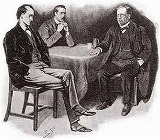
“Then what is the theory in your mind?”
“The bicycle may have been a blind. It may have been hidden somewhere, and the pair gone off on foot.”
“Quite so, but it seems rather an absurd blind, does it not? Were there other bicycles in this shed?”
“Several.”
“Would he not have hidden a couple, had he desired to give the idea that they had gone off upon them?”
“I suppose he would.”
“Of course he would. The blind theory won’t do. But the incident is an admirable starting-point for an investigation. After all, a bicycle is not an easy thing to conceal or to destroy. One other question. Did anyone call to see the boy on the day before he disappeared?”
“No.”
“Did he get any letters?”
“Yes, one letter.”
“From whom?”
“From his father.”
“Do you open the boys’ letters?”
“No.”
“How do you know it was from the father?”
“The coat of arms was on the envelope, and it was addressed in the Duke’s peculiar stiff hand. Besides, the Duke remembers having written.”
“When had he a letter before that?”
“Not for several days.”
“Had he ever one from France?”
“No, never.”
“You see the point of my questions, of course. Either the boy was carried off by force or he went of his own free will. In the latter case, you would expect that some prompting from outside would be needed to make so young a lad do such a thing. If he has had no visitors, that prompting must have come in letters; hence I try to find out who were his correspondents.”
“I fear I cannot help you much. His only correspondent, so far as I know, was his own father.”
“Who wrote to him on the very day of his disappearance. Were the relations between father and son very friendly?”
“His Grace is never very friendly with anyone. He is completely immersed in large public questions, and is rather inaccessible to all ordinary emotions. But he was always kind to the boy in his own way.”
“But the sympathies of the latter were with the mother?”
“Yes.”
“Did he say so?”
“No.”
“The Duke, then?”
“Good heaven, no!”
“Then how could you know?”
“I have had some confidential talks with Mr. James Wilder, his Grace’s secretary. It was he who gave me the information about Lord Saltire’s feelings.”
“I see. By the way, that last letter of the Duke’s - was it found in the boy’s room after he was gone?”
“No, he had taken it with him. I think, Mr. Holmes, it is time that we were leaving for Euston.”
“I will order a four-wheeler. In a quarter of an hour, we shall be at your service. If you are telegraphing home, Mr. Huxtable, it would be well to allow the people in your neighbourhood to imagine that the inquiry is still going on in Liverpool, or wherever else that red herring led your pack. In the meantime I will do a little quiet work at your own doors, and perhaps the scent is not so cold but that two old hounds like Watson and myself may get a sniff of it.”
That evening found us in the cold, bracing atmosphere of the Peak country, in which Dr. Huxtable’s famous school is situated. It was already dark when we reached it. A card was lying on the hall table, and the butler whispered something to his master, who turned to us with agitation in every heavy feature.
“The Duke is here,” said he. “The Duke and Mr. Wilder are in the study. Come, gentlemen, and I will introduce you.”